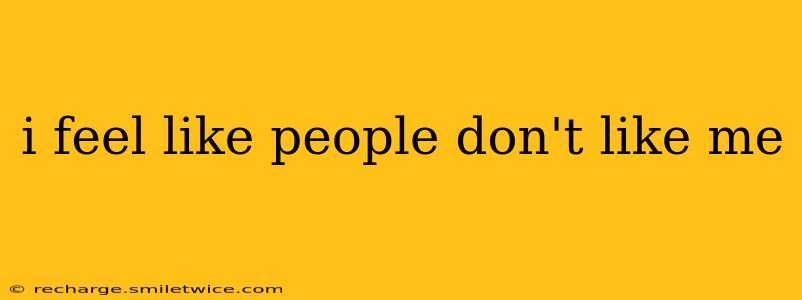Feeling Like People Don't Like You: Understanding and Overcoming Social Isolation
It's a painful and common experience to feel like people don't like you. This feeling can stem from various sources, ranging from genuine social difficulties to anxieties and insecurities. It's crucial to understand that this feeling doesn't necessarily reflect reality; often, our perceptions are skewed by our own internal narratives. This article will explore the potential causes of this feeling and offer practical strategies to overcome it and build stronger, more fulfilling relationships.
What Causes the Feeling of Not Being Liked?
This feeling can arise from a complex interplay of factors. Let's explore some key contributors:
-
Low Self-Esteem: Individuals with low self-esteem often interpret ambiguous social interactions negatively. A simple oversight might be perceived as a deliberate slight, fueling the feeling of rejection.
-
Social Anxiety: Social anxiety can manifest as a fear of negative evaluation, leading to self-consciousness and avoidance of social situations. This avoidance can create a self-fulfilling prophecy, further reinforcing the belief that others dislike them.
-
Past Experiences: Negative past experiences, such as bullying, rejection, or trauma, can deeply impact how we perceive social interactions in the present. These past experiences can shape our expectations and interpretations of others' behavior.
-
Misinterpretations: We often misinterpret nonverbal cues or subtle comments, leading to inaccurate conclusions about how others feel toward us. For example, someone's quiet demeanor might be mistaken for dislike when it's simply their personality.
-
Perfectionism: Striving for unattainable perfection can make it challenging to form genuine connections. The fear of judgment can prevent us from being authentic and vulnerable, making it difficult for others to connect with us.
-
Comparison: Constantly comparing ourselves to others can lead to feelings of inadequacy and the belief that we're not good enough. This can negatively impact our self-perception and our relationships with others.
How Can I Tell if People Actually Dislike Me?
Differentiating between perceived rejection and actual dislike is crucial. While feeling disliked is subjective, there are some indicators you can consider:
-
Consistent Negative Feedback: Receiving frequent and constructive criticism can be a sign that your behavior or actions are causing friction. However, it's important to distinguish between constructive criticism and personal attacks.
-
Isolation: If you consistently find yourself excluded from social gatherings or activities, it could suggest that others are not interested in your company. Consider whether this is due to your own avoidance or genuine exclusion.
-
Lack of Reciprocity: Relationships should be reciprocal. If you consistently initiate contact and receive little to no response, it's a potential red flag.
-
Openly Negative Interactions: If people are openly critical or hostile towards you, it's likely that they dislike you. However, you should also consider the context and the possibility of miscommunication.
What Can I Do if I Feel Like People Don't Like Me?
Overcoming this feeling requires a multifaceted approach:
-
Self-Compassion: Treat yourself with kindness and understanding. Acknowledge your feelings without judgment.
-
Challenge Negative Thoughts: Identify and challenge negative thought patterns. Are these thoughts based on facts or assumptions?
-
Build Self-Esteem: Engage in activities that boost your self-esteem, such as pursuing hobbies, setting goals, and practicing self-care.
-
Improve Social Skills: Consider taking a course or seeking therapy to improve your social skills.
-
Seek Professional Help: A therapist can help you understand the underlying causes of your feelings and develop strategies for coping.
-
Focus on Building Genuine Connections: Concentrate on forming authentic relationships with people who share your values and interests. Quality over quantity is key.
How Can I Improve My Social Interactions?
Improving social interactions is a gradual process. Here are some helpful tips:
-
Active Listening: Pay close attention to what others are saying and show genuine interest.
-
Empathy: Try to understand other people's perspectives and feelings.
-
Positive Body Language: Maintain eye contact, smile, and use open body language.
-
Be Yourself: Don't try to be someone you're not. Authenticity attracts genuine connections.
-
Join Groups and Activities: Engage in activities that interest you to meet like-minded people.
Remember, feeling like people don't like you is a common experience. With self-awareness, self-compassion, and proactive steps, you can overcome this feeling and cultivate fulfilling relationships. If the feeling persists or significantly impacts your well-being, seeking professional help is a valuable step towards building a more positive social life.
